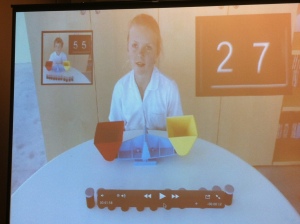SIGCSE First night, Workshop: CS Unplugged!
Posted: March 2, 2012 Filed under: Education | Tags: design, education, games, higher education, sigcse, teaching, teaching approaches, tools 1 CommentGot back from the first workshop a couple of hours ago, Workshop 9: Computer Science Unplugged, Robotics and Research Activities, Tim Bell, Daniela Marghitu and Lynn Lambert. Daniela couldn’t make it this evening so her place was expertly filled by another pair from Auburn. I’ve talked about CS Unplugged before but it was fascinating to see the experts talking about their experiences and giving us all the experience of what it’s like to be in an Unplugged classroom. I took some photos which will probably capture the immersive and enjoyable sense of this hands-on experience.
Here are some of the double-sided cards that can be used to show the 2D parity trick, where students are drawn into constructing the use and checking of parity with a simple 5×5 (or 9×9) grid of cards. Basically, once drawn up the student can flip any of the cards and the instructor can walk in from outside and legitimately pick the flipped card.
These are Tim’s, from the University of Canterbury, and they are both a handy tool for CS Unplugged and a cool way to give people a calling card of who gave you the talk.
Tim and Lynn were very honest about the degree of knowledge that could be conveyed to elementary school students – we’re not talking about getting all of the CS completely accurate but, in a setting where we can get lost in the cracks, the students would remember that CS people came to their school and it was interesting and engaging. (And, for me, the CS is pretty close. 🙂 )
The next picture is of a Pirate’s Treasure puzzle, where students have to pick A or B and, depending on what they choose, they hop to different islands. This introduces several key computing concepts: Finite State Automata,  Complexity but, for me, it also makes students think about exploring a space in order to be able to improve their decision and thinking processes.
Complexity but, for me, it also makes students think about exploring a space in order to be able to improve their decision and thinking processes.

The next picture is slightly curious and, rather than being an activity, it’s a diagram showing all the states that a VCR could end up in when you’re setting the clock – and the number of different pathways between them. Is it any wonder that these devices give us trouble? Building on what students had learned about the different islands (states) that you could catch a ship to (transition to) – it suddenly explains why human interface design is so incredibly important.
Overall, this was a great workshop. We had many participatory activities – I was the bit representing ‘4’ for a very happy 10 minutes – and an excellent display of robotics and how they could be used with students in camp activities. Also, somewhat counterintuitively, how robots could be used to teach CS Unplugged.
From a theoretical perspective, CS Unplugged is heavily constructivist. In informal terms, constructivists assert that the generation of knowledge and meaning in humans comes from an interaction between what they experience and the frameworks that they have in their head. In this case, CS Unplugged, the basic goal is to present something with which a student can interact, but in its affordance and its goals, it drives them towards forming the correct knowledge of an area of CS, even without us explaining anything. To give an example, the student in the picture had learned quick sort enough to demonstrate it, despite never being explicitly told what quick sort was. She’s 12. The numbers in the pictures show the number of steps for a student using a simple sorting technique, and the one that she used. Yes, she’s shaved over half the steps off.
We had many examples like this – students who learned to count in binary from observation and interaction, without anyone having to formally discuss powers of two or underlying mathematics.
To be honest, I can’t do a three-hour workshop justice in 700 words, and I’d like to get some sleep before tomorrow’s keynote. However, if you haven’t checked out the CS Unplugged website yet, then I strongly recommend it. If you get the chance to see these presenters at work, then I strongly suggest that, too.



[…] already seen examples of customised musical work and video with support materials from the CS Unplugged people, so what I’m really saying is that I hadn’t mapped this in this way. Wake up, […]
LikeLike